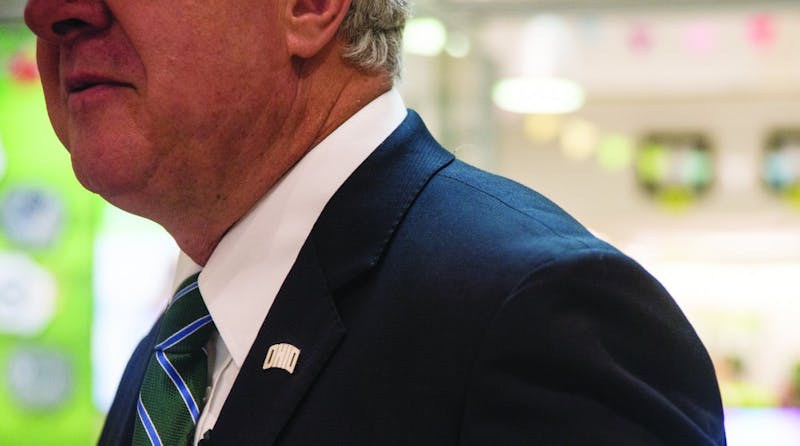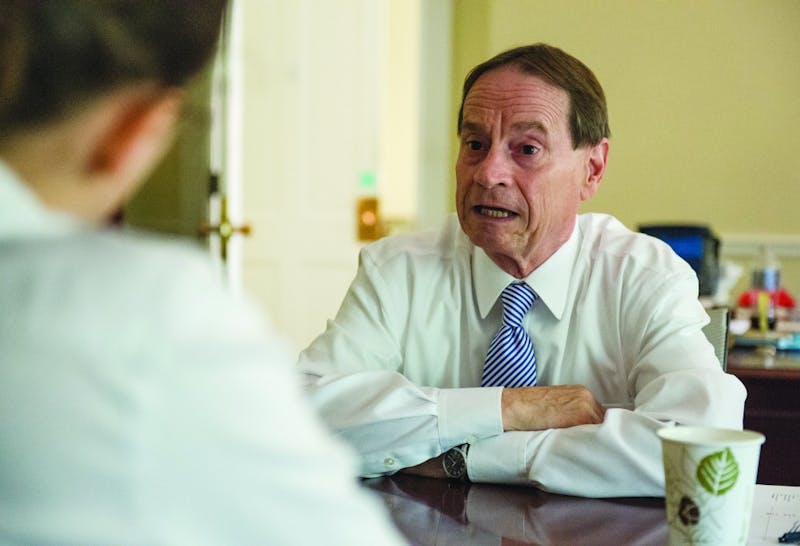Landing Page
Special Projects
This story is part of a series of specially designed stories that represents some of the best journalism The Post has to offer. Check out the rest of the special projects here.

MEAGAN HALL
09.07.17
When David Descutner and his wife, DeLysa Burnier, drove across the Hocking River into Athens on a Saturday night in 1979, they did so in a borrowed car with no plans to stay long.
In fact, Descutner admits, he “wasn’t all that crazy” about the town in the first place. But Burnier had a doctoral degree to complete, and Descutner was taking a job as an assistant professor in the meantime.

Matt Starkey | FILE
Interim Executive Vice President and Provost, David Descutner gives an interview on Wednesday, August 30, 2017 in Cutler Hall.
Nearly 40 years have passed, and Descutner now holds one of Ohio University’s top positions: interim executive vice president and provost. The town that he once showed indifference to has since become his home.
“I like the local culture here,” Descutner said. “The sense of art and history, community involvement, politics … there’s a lot of people who live here who aren’t associated with the university who are some of the coolest, most interesting people I’ve ever met, and that, of course, makes life here easy to live.”
Before to his appointment as dean of University College in 2003, Descutner served in various capacities in the School of Interpersonal Communication — known today as the School of Communication Studies — working his way up the ladder from instructor to interim director.
“I think the absence of distance between everyday life and university leadership is one of the things that makes this more of a community and less of a university."David Descutner, interim OU president
After a brief period of retirement, Descutner was made interim chair of social medicine for the Heritage College of Osteopathic Medicine by the school’s dean, Kenneth Johnson. It was during that time that former OU President Roderick McDavis announced his impending departure, leading the Board of Trustees to offer Descutner a new position: interim president of the university.
“It was a complete shock to me,” Descutner said of the offer. “And I would not have considered doing it had I not been at the college of medicine for a year.”
Descutner served as interim president from February to June, laying the foundations for the transition between McDavis and Duane Nellis, who was announced as the university’s new president in February and took office in June.
His short time in office, however, was not without tough decisions to be made. His support of the charges brought against 70 demonstrators arrested in Baker Center clashed with the wishes of university senates, who passed resolutions demanding the charges be dropped. When OU professor Andrew Escobedo was found to have sexually harassed several female students, it was up to Descutner to initiate the dismissal process.
Despite these challenges, Descutner views his time in higher education as a “privilege” that has provided him with “limitless opportunities.”
“I think the absence of distance between everyday life and university leadership is one of the things that makes this more of a community and less of a university,” he said. “And I think it’s a high quality university.”
Descutner’s own college days, he’ll readily admit, were anything but smooth sailing.
“Well, I’ll start by saying I’m glad there weren’t camera phones,” he laughed. “I had a very rough time. I was a first-generation student. I was a baby of five ... but I was not planning on going to college. Nobody I knew was going to college.”
Born in the small coal mining town of Crucible, Pennsylvania — population 725 as of the 2010 U.S. census — Descutner’s early prospects for higher education were lackluster at best. His father was a high school graduate, while his mother stopped her education after the eighth grade.
A talent for tennis and a lucky break with a coach that sent him down the path to college. With his parents’ encouragement and a small loan in hand, Descutner set out for Slippery Rock University in western Pennsylvania.
“And I did all the wrong things.” he said. “ I didn’t go to class. I didn’t meet my professors … I was a little thug.”
After a “horrible” first semester yielded a 2.3 GPA and a bad rap with authority, his professors brought him back from the brink, introducing him to the prospect of grad school and convincing him to join the university’s debate team, despite his notion that it was “totally uncool.”
The difficulties he faced during his own college career have created a special place in Descutner’s heart for first-generation students.
“One-third of our students are first-generation on this campus,” Descutner said. “First-generation students struggle more than other students do … so that has really created an endless well of empathy for me when it comes students who are struggling. It’s not because they can’t do it. It’s because they haven’t figured out how it is they can do it.”
Providing aid to those in need has been a personal mission for both Descutner and Burnier, who are involved in numerous charitable and scholarship foundations, both locally and across state lines. Local involvement with organizations like the Athens Foundation and United Campus Ministries has supplemented their financial contributions at OU, the University of Illinois and Descutner’s alma mater, Slippery Rock.
The couple has had an especially deep connection to The Gathering Place, a local drop-in center devoted to caring for adults struggling with mental illness.
“We got to know, over the years, the men and women who were there,” Descutner said. “And it was a good example of profound care, and encouraging people who are suffering all sorts of difficulties to participate in the world, to work, and more importantly, to be a citizen. So that was very cool. That was sort of my first exposure to that kind of community work.”
When Descutner was named interim executive vice president and provost in place of Pam Benoit — who accepted a job at the University of Alabama at Birmingham — Nellis had only kind words for his second-in-command.
“David Descutner has provided invaluable service to Ohio University for nearly four decades, most recently in his role as interim president,” Nellis said in a university-wide email when the announcement was made. “He has been a tremendous asset to me, personally, as I embarked upon the beginning of my tenure as OHIO’s 21st president. It only makes sense to continue working closely with David as I continue to transition into my new role.”
As it currently stands, the university is working to establish a search committee that will “handle all subsequent steps” in the process to find the next executive vice president and provost, OU Spokesman Jim Sabin said. Though such a committee has not yet been created, Sabin said the position would likely be filled in the summer or early fall 2018.
Descutner himself will have limited involvement in the process itself — only to the extent that he would help form the committee, he explained. But he does have a bit of advice for his successor.
“Be prepared to learn a heck of a lot from President Nellis,” Descutner said. “And be looking forward to working with the deans and the staff here.
As for what’s next, Descutner laughs at the prospect of “re-retiring.”
“I’m going to step down and consider going back into the College of Medicine,” he said. “I’ve been told that they’d have me back.”
Landing Page
This story is part of a series of specially designed stories that represents some of the best journalism The Post has to offer. Check out the rest of the special projects here.